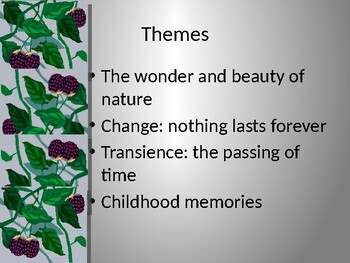


Unsurprisingly, poetic ‘voice’ contrasts are less immediately obvious than substance-centred divisions however, as will be explored within the selected works, a poem’s emotional disposition often varies according to whether present-day adult retrospective perceptions predominate or whether recalled childhood feelings are summoned and thus prevail. Plath recalls her early years fondly but, following her bereavement, represents her later childhood as laden with anxiety and parental tension. Thomas recalls blissful childhood sojourns in rhapsodic terms while Heaney, more explicitly, remembers a vigorous boyhood of warmth and family affection. Different attitudes to personal youthful situations are noticeable in the works of three twentieth century poets: Dylan Thomas, Seamus Heaney and Sylvia Plath. These are: delight versus anguish, family affection against family resentment, ‘adult’ voice vis-à-vis ‘child’ voice. Yet the principle of thematic binary distinction is valid so that three resulting contrasts invite meaningful analysis and are addressed within this paper. While the focus of most poetry of childhood recollection can either be allocated within a ‘positive’ or ‘negative’ pairing, such broad dualism can be overly simplistic.


 0 kommentar(er)
0 kommentar(er)
